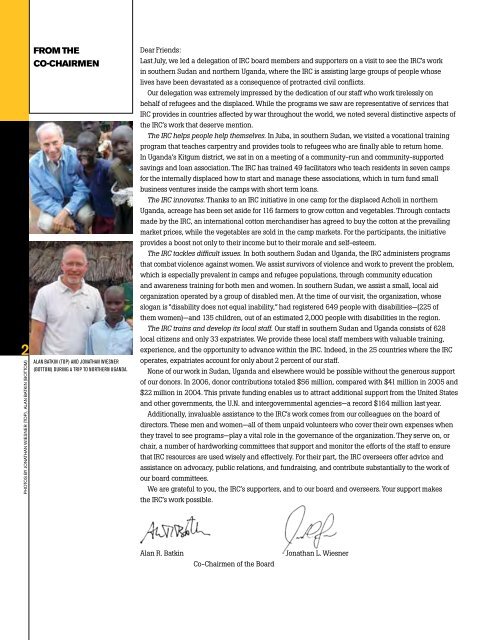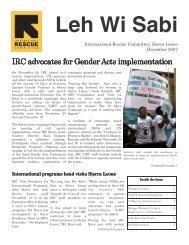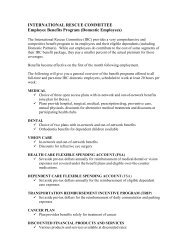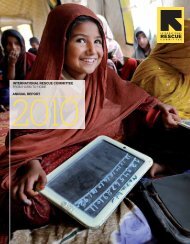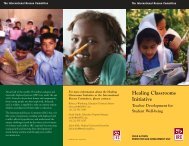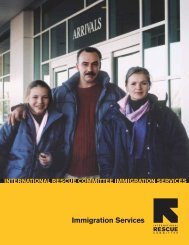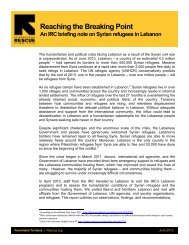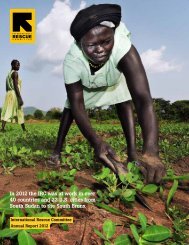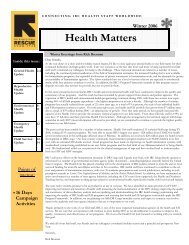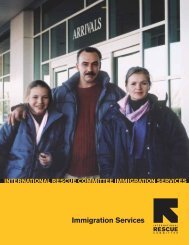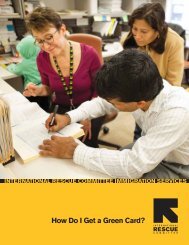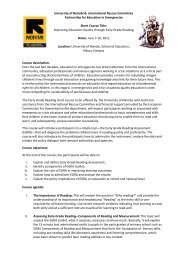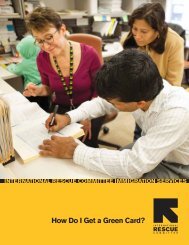International Rescue Committee 2006 Annual Report
International Rescue Committee 2006 Annual Report
International Rescue Committee 2006 Annual Report
Create successful ePaper yourself
Turn your PDF publications into a flip-book with our unique Google optimized e-Paper software.
2<br />
Photos by Jonathan Wiesner (top), Alan Batkin (Bottom)<br />
From the<br />
co-chaiRmen<br />
Alan Batkin (top) and Jonathan Wiesner<br />
(bottom) during a trip to Northern Uganda.<br />
Dear Friends:<br />
Last July, we led a delegation of IRC board members and supporters on a visit to see the IRC’s work<br />
in southern Sudan and northern Uganda, where the IRC is assisting large groups of people whose<br />
lives have been devastated as a consequence of protracted civil conflicts.<br />
Our delegation was extremely impressed by the dedication of our staff who work tirelessly on<br />
behalf of refugees and the displaced. While the programs we saw are representative of services that<br />
IRC provides in countries affected by war throughout the world, we noted several distinctive aspects of<br />
the IRC’s work that deserve mention.<br />
The IRC helps people help themselves. In Juba, in southern Sudan, we visited a vocational training<br />
program that teaches carpentry and provides tools to refugees who are finally able to return home.<br />
In Uganda’s Kitgum district, we sat in on a meeting of a community-run and community-supported<br />
savings and loan association. The IRC has trained 49 facilitators who teach residents in seven camps<br />
for the internally displaced how to start and manage these associations, which in turn fund small<br />
business ventures inside the camps with short term loans.<br />
The IRC innovates. Thanks to an IRC initiative in one camp for the displaced Acholi in northern<br />
Uganda, acreage has been set aside for 116 farmers to grow cotton and vegetables. Through contacts<br />
made by the IRC, an international cotton merchandiser has agreed to buy the cotton at the prevailing<br />
market prices, while the vegetables are sold in the camp markets. For the participants, the initiative<br />
provides a boost not only to their income but to their morale and self-esteem.<br />
The IRC tackles difficult issues. In both southern Sudan and Uganda, the IRC administers programs<br />
that combat violence against women. We assist survivors of violence and work to prevent the problem,<br />
which is especially prevalent in camps and refugee populations, through community education<br />
and awareness training for both men and women. In southern Sudan, we assist a small, local aid<br />
organization operated by a group of disabled men. At the time of our visit, the organization, whose<br />
slogan is “disability does not equal inability,” had registered 649 people with disabilities—(225 of<br />
them women)—and 135 children, out of an estimated 2,000 people with disabilities in the region.<br />
The IRC trains and develop its local staff. Our staff in southern Sudan and Uganda consists of 628<br />
local citizens and only 33 expatriates. We provide these local staff members with valuable training,<br />
experience, and the opportunity to advance within the IRC. Indeed, in the 25 countries where the IRC<br />
operates, expatriates account for only about 2 percent of our staff.<br />
None of our work in Sudan, Uganda and elsewhere would be possible without the generous support<br />
of our donors. In <strong>2006</strong>, donor contributions totaled $56 million, compared with $41 million in 2005 and<br />
$22 million in 2004. This private funding enables us to attract additional support from the United States<br />
and other governments, the U.N. and intergovernmental agencies—a record $164 million last year.<br />
Additionally, invaluable assistance to the IRC’s work comes from our colleagues on the board of<br />
directors. These men and women—all of them unpaid volunteers who cover their own expenses when<br />
they travel to see programs—play a vital role in the governance of the organization. They serve on, or<br />
chair, a number of hardworking committees that support and monitor the efforts of the staff to ensure<br />
that IRC resources are used wisely and effectively. For their part, the IRC overseers offer advice and<br />
assistance on advocacy, public relations, and fundraising, and contribute substantially to the work of<br />
our board committees.<br />
We are grateful to you, the IRC’s supporters, and to our board and overseers. Your support makes<br />
the IRC’s work possible.<br />
Alan R. Batkin<br />
Co-Chairmen of the Board<br />
Jonathan L. Wiesner


